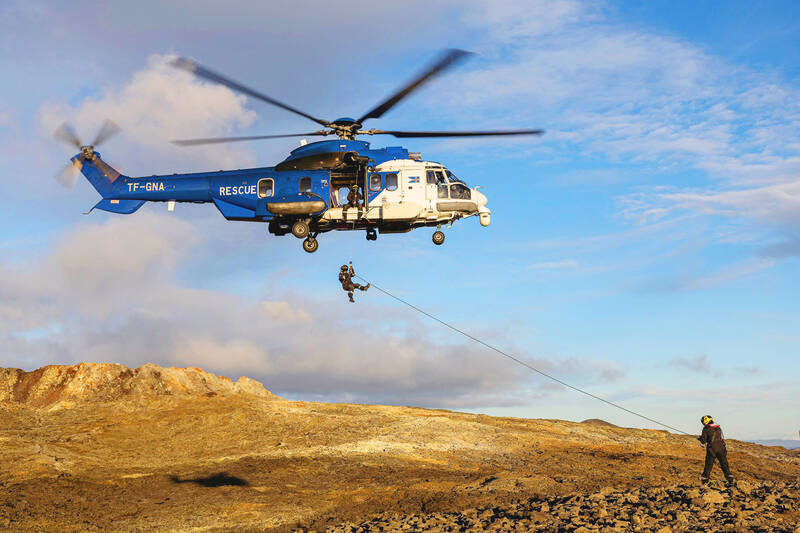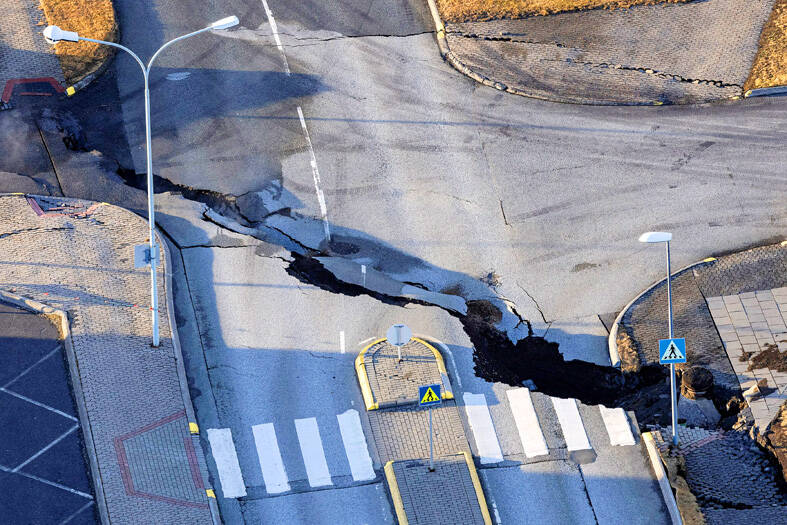After a barrage of earthquakes that herald an impending volcanic eruption, some residents who evacuated the Icelandic town of Grindavik say they are not sure they will ever return.
“There are going to be a lot of people who don’t want to go there. My mother said: ‘I never want to go there again,’” said Eythor Reynisson, who was born and raised in Grindavik.
The fishing port of 4,000 people on Iceland’s south coast was evacuated on Saturday last week after magma shifting under the Earth’s crust caused hundreds of earthquakes — a warning of a likely volcanic eruption.

Photo: Reuters
Thousands of smaller tremors have shaken the region since.
With massive crevices ripping roads apart and buildings’ concrete foundations shattered, the once picturesque Grindavik now resembles a warzone.
The damage to the town hall would take months to repair.

Photo: Reuters
Even if the magma flow stops and no eruption occurs, “there is the issue of whether one should live in a town like this,” said Freysteinn Sigmundsson, a geophysicist at the University of Iceland.
The Reykjanes Peninsula had not experienced an eruption for eight centuries until 2021.
Since then, three eruptions have struck — all in remote uninhabited areas — and volcanologists say this might be the start of a new era of activity in the region.
Sigmundsson said that “a difficult period of uncertainty” lies ahead, as eruptions could happen in coming years.
That has left residents wondering whether it is worth rebuilding their homes.
Sigmundsson said that for the region to be deemed safe, the current activity would first need to cease.
“There is a possibility that the activity will move to another area, and then it could be acceptable to go back to Grindavik,” he said.
Despite the conditions, a resilient community spirit was evident as residents this week lined up to enter Grindavik to collect belongings they left in their hurried exodus.
Residents embraced each other and shared moments of laughter.
“I am really emotional. That’s basically how I am feeling right now,” Johannes Johannesson said.
For some, living around volcanoes comes with the territory.
“We are a strong community, so I think it’s possible to build it up again,” Reynisson said.
Iceland is home to 33 active volcano systems, the highest number in Europe. Towns have been hit before.
In 1973, a fissure erupted 150m from the town center on the island of Heimaey, surprising locals at dawn.
One-third of homes were destroyed and the town of 5,300 residents was evacuated. One person died.
In Grindavik, steam fills the air from burst hot water pipes and the electricity grid struggles to keep operating at night because of the infrastructure damage.
Locals are seeking to stay in hotels, with friends or family, or at emergency shelters while they wait for life to return to normal.
Authorities have organized occasional trips into the port town, escorting those with homes in the most perilous parts to rescue everything from cherished pets to photo albums, furniture and clothing.
The operations proceed with utmost caution: on Tuesday the village was quickly emptied as sulfur dioxide measurements indicated that magma was moving closer to the surface.
“There was panic,” Reynisson said.
For almost a week, Iceland has been on tenterhooks, prepared for an eruption at any moment.
“There is still a flow of new magma into this crack and it is widening,” Sigmundsson said.
As long as there is an inflow of magma into the crack, the likelihood of an eruption remains high.
“We need to be prepared for an eruption happening today or within the coming week or even up to a month,” the researcher added.
The most likely place for an eruption “is from the town of Grindavik northwards,” Sigmundsson said.
For residents, this means an extended and anxiety-filled time over the weeks to come.
“Plans now are to try to manage. Try to just get the family into a routine and keep on going,” Johannesson said.

‘UNUSUAL EVENT’: The Australian defense minister said that the Chinese navy task group was entitled to be where it was, but Australia would be watching it closely The Australian and New Zealand militaries were monitoring three Chinese warships moving unusually far south along Australia’s east coast on an unknown mission, officials said yesterday. The Australian government a week ago said that the warships had traveled through Southeast Asia and the Coral Sea, and were approaching northeast Australia. Australian Minister for Defence Richard Marles yesterday said that the Chinese ships — the Hengyang naval frigate, the Zunyi cruiser and the Weishanhu replenishment vessel — were “off the east coast of Australia.” Defense officials did not respond to a request for comment on a Financial Times report that the task group from

Asian perspectives of the US have shifted from a country once perceived as a force of “moral legitimacy” to something akin to “a landlord seeking rent,” Singaporean Minister for Defence Ng Eng Hen (黃永宏) said on the sidelines of an international security meeting. Ng said in a round-table discussion at the Munich Security Conference in Germany that assumptions undertaken in the years after the end of World War II have fundamentally changed. One example is that from the time of former US president John F. Kennedy’s inaugural address more than 60 years ago, the image of the US was of a country

DEFENSE UPHEAVAL: Trump was also to remove the first woman to lead a military service, as well as the judge advocates general for the army, navy and air force US President Donald Trump on Friday fired the chairman of the Joint Chiefs of Staff, Air Force General C.Q. Brown, and pushed out five other admirals and generals in an unprecedented shake-up of US military leadership. Trump wrote in a post on Truth Social that he would nominate former lieutenant general Dan “Razin” Caine to succeed Brown, breaking with tradition by pulling someone out of retirement for the first time to become the top military officer. The president would also replace the head of the US Navy, a position held by Admiral Lisa Franchetti, the first woman to lead a military service,

BLIND COST CUTTING: A DOGE push to lay off 2,000 energy department workers resulted in hundreds of staff at a nuclear security agency being fired — then ‘unfired’ US President Donald Trump’s administration has halted the firings of hundreds of federal employees who were tasked with working on the nation’s nuclear weapons programs, in an about-face that has left workers confused and experts cautioning that the Department of Government Efficiency’s (DOGE’s) blind cost cutting would put communities at risk. Three US officials who spoke to The Associated Press said up to 350 employees at the National Nuclear Security Administration (NNSA) were abruptly laid off late on Thursday, with some losing access to e-mail before they’d learned they were fired, only to try to enter their offices on Friday morning